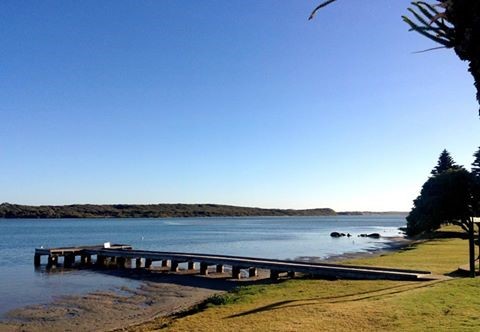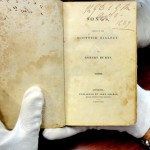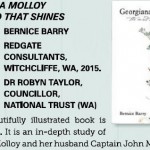Doctor Alfred Green
Dr Green’s name appears often in the settlers’ letters, journals and diaries, not least because as their physician and surgeon he was an important part of daily life. Their comments about his work and their observations about his personal life paint a sketchy picture of the man but, viewed in isolation, the collection of anecdotes that cropped up during my research failed to portray him in any real depth.
It was a while before I thought about him in a more individual way and considered the background that must have influenced his life. Green was twenty-five, less than a year older than Georgiana Molloy, when he and the other ‘Warrior’ passengers disembarked at the Swan River Colony, now Perth WA, in 1830. He stayed there for a while working at the hospital and when he arrived in Augusta after being appointed as the new physician it wasn’t surprising that he was glad to renew his friendship with the settlers, including the Turner family. James Woodward Turner was a surveyor, carpenter and builder exactly like Green’s own father so, although Green was raised as a Baptist, their family backgrounds were very similar being considered neither ‘professional’ men nor landed gentlemen but still financially better off than the other families in Augusta.
The doctor was one of the few single men in that middle class of society, but a gentleman in his own right through his professional status. It was a lonely way to live, as a neighbour of three closely knit families and among a larger group of servants, labourers and military men. His work as the medical man in the region was often horrific, as shown in his statement in this extract from the newspaper report of an incident that took place in Augusta in 1835, documented by John Molloy as Resident Magistrate. Mary, wife of Andrew Smith, was found dead with head wounds after sharing a bottle of brandy one evening with the Kellam brothers.
“I received an order to examine the body more minutely which I did. On removing the scalp, I found four distinct points, having the appearance of being caused by some external violence. I then very minutely examined the scull, to ascertain if there was any fracture; but I found none. I examined more particularly that part of the scull where the wounds were, but I found nothing that could lead me to suppose they were the immediate cause of her death. I proceeded to move the scull cap, and found a quantity of extravasated blood, sufficient to nearly fill a small tea cup ; the vessels of the brain were highly turgid – surprisingly so.”
Perth Gazette and Western Australian Journal. March 1835
There are old, local anecdotes describing Green’s early affection for James W Turner’s daughter Ann (Nancy) but if he was in love with her from the time of the voyage to Australia when he first met her as an eighteen year old, he had to be a very patient man. Two years later she married James McDermott who was captain of the ‘Emily Taylor’, the ship that brought the settlers to Augusta in 1830, and she sailed away to make a home in Perth.
The surviving stories from the next few years show that Alfred Green was more than once at the centre of small dramas, seemingly often caused by misuse of alcohol. Georgiana describes several occasions when her family needed the doctor urgently but he was unavailable because he had been drinking heavily, or simply couldn’t be found. Even so, her references to her neighbour are never harsh and show a level of regard and respect that transcends any of the incidents she describes. The doctor regularly joined in with Molloy family excursions and plant-collecting and was welcome in their home, often spending the evening with them. And he was certainly not the only person in that small community to show the effects of daily alcohol rations, provided by the government to counteract the lack of fresh fruit, what we now recognise to be a Vitamin C deficiency.
Captain James McDermott died in 1834 in a shipwreck and Nancy McDermott returned to her father’s house in Augusta, a young widow with two small children, Ann and James. Dr Green was there, an old friend, but a decade passed before their relationship became the union he may always have dreamed of. They married in 1844 and had four children: Samuel (after Alfred’s own father) Suzanna, Elizabeth and Alfred.
Nancy died in 1867 in Toodyay where Green was living and working as the District Medical Officer and she was buried in Nardie cemetery. He married for a second time in 1875; his bride was Nancy’s younger sister, Maria. Assumption is a dangerous route for a historian but I still like to think that when Nancy Mc Dermott née Ann Turner came home to Augusta and resumed her close friendship with Alfred Green, he found the contentment that had been missing from his early, troubled years in the colony. His obituary in the Perth Gazette describes him as ‘widely respected’ and many old colonists from the area attended his funeral. He died at his son’s home in Northam in 1895 at the age of 91.
……………………………………………………………………………………………………………………………………..
Today, the many descendants of the Green and Turner families are the holders of much more information and maintain strong connections with relatives and with the region where their ancestor first arrived in WA. I was fortunate in being contacted earlier this year by one of Alfred Green’s descendants who generously shared some information about the Green family’s background in England.



